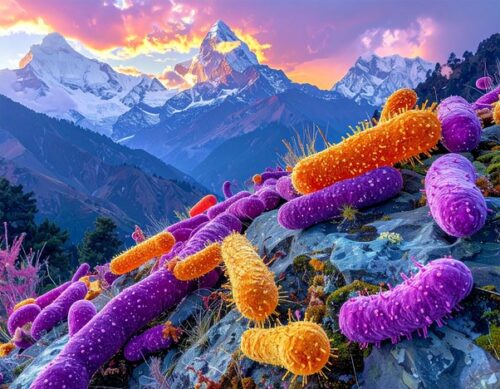LSST Elephant and Castle Researcher Discovers Himalayan Bacterium with Potential to Revolutionise Sustainable Bioplastic Production
By Kunal Chan Mehta | Article Date: 15 September 2025

An LSST Elephant and Castle researcher and her team have discovered a novel bacterial strain of the Cupriavidus genus from a dry glacial lakebed in the Indian Himalayas that shows exceptional promise for producing Poly-3-hydroxybutyrate (PHB) – a biodegradable polymer with potential to replace petroleum-based plastics in selected applications.
Dr Yasmin Mirza, Course Coordinator (DMU) and Lecturer in Health at LSST Elephant & Castle, is a co-author on the study that has been published in the prestigious ‘Archives of Microbiology’ – a Springer Nature publication. Her involvement brings LSST’s expertise in microbiology and applied sciences to this pioneering cross-disciplinary research on a global scale.

PHB is a biodegradable alternative to conventional plastics and microbial production is a crucial step toward greener industrial practices. The discovery demonstrates how field microbiology, genomics and applied biotechnology can converge to deliver tangible environmental solutions. PHB is particularly attractive because it is biodegradable, biocompatible (safe for living systems) and can be processed using standard plastic-making methods.
Researchers tout it as a sustainable substitute for traditional plastics, since it decomposes into harmless byproducts and reduces reliance on fossil fuels. Its thermoplastic nature – meaning it can be melted and reshaped like conventional plastics – makes it practical for a wide range of applications from packaging to agriculture and medical devices.
“This discovery demonstrates how curiosity-driven field science and modern genomics can combine to deliver sustainable solutions,” said Dr Yasmin Mirza. “For our students and researchers at LSST, it’s an instructive case of how interdisciplinary research can translate into real-world environmental and commercial benefits.”
This work matters not just for scientific innovation but for the planet. Bioplastics like PHB can significantly cut carbon footprints, curb plastic pollution and help ease greenhouse effects by replacing petrochemical-based plastics. Thanks to studies showing that PHB degrades cleanly and safely, this research marks a promising step toward greener materials and a healthier environment.
Ali Jafar Zaidi, LSST’s CEO, said: “This breakthrough highlights LSST’s commitment to cutting-edge research. By isolating this bacterium from the Himalayas, our researchers are at the forefront of sustainable science, demonstrating how LSST’s rigorous research translates into real solutions for industry and society.”
Syed Rizvi, Academic Dean of LSST Elephant & Castle and LSST Stratford, as well as Dean of Learning and Teaching, added: “This outstanding research exemplifies the power of interdisciplinary science, where microbiology, genomic and chemical engineering converge to address real-world challenges. It further demonstrates how applied research at LSST can translate into tangible solutions that benefit society.”
Dr Maryam Idris-Usman, Academic Team Lead at LSST Birmingham and LSST’s Research Centre Coordinator, commented: “I am thrilled to commend this groundbreaking research by Dr Mirza on the novel Himalayan bacterium and its potential for sustainable bioplastic production. This discovery highlights the critical role of exploring microbial biodiversity in unique ecosystems like the Himalayas. This research supports the UN’s Sustainable Development Goals, potentially reducing our reliance on petroleum-based plastics and promoting environmentally friendly alternatives. LSST’s Research Centre supports this innovative and impactful work, driving us towards a more sustainable future.”
Dr Yasmin went on to add: “The microbial biodiversity of high-altitude Himalayan ecosystems remains largely underexplored, despite an increasing awareness of cold-adapted communities and their significant biotechnological potential – our research has just started.”
Understanding the Discovery
Dr Yasmin Mirza and her team discovered a new strain of Cupriavidus basilensis in the Indian Himalayas. This bacterium can naturally produce a biodegradable plastic called PHB when grown on simple food sources like plant oils. Remarkably, it stored nearly three-quarters of its weight as this eco-friendly plastic, which is strong, durable, and safely biodegradable.
The team also mapped the entire phaCAB operon that controls plastic production in the bacterium, confirming that it is well-equipped for large-scale use. They tested different nutrient sources and found that oils, especially oleic acid, produced far more plastic as compared to sugar sources. The extracted PHB showed strong thermal stability, making it practical for packaging, agriculture, and medical use.
This research is highly relevant as PHB can replace petroleum-based plastics, reducing plastic waste, lowering the carbon footprint, and helping to combat the greenhouse effect—steps critical for a sustainable future. This combination of high yield, polymer quality and robustness makes this strain particularly promising for sustainable, large-scale production of bioplastics.
Reference to original published work
Sinha, S., Khonde, V., Mirza, Y., Nandi, S., Dhotre, D. & Ghosalkar, A., 2025. Isolation and characterization of a bacteria of Cupriavidus genus from Indian Himalayan region and its evaluation for production of Poly-3-hydroxybutyrate. Archives of Microbiology, 207, p.231. https://doi.org/10.1007/s00203-025-04425-w
For additional information or interviews, please direct questions to LSST’s Public Relations Manager via kunal.mehta@lsst.ac.
We hope you enjoyed reading LSST News. Join our vibrant academic community and explore endless opportunities for growth and learning at www.lsst.ac/courses or via admissions@lsst.ac. Discover your path at LSST and embark on a transformative educational journey today. Think Higher. Think LSST.




